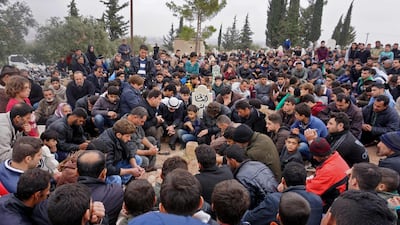Local journalists and media activists in north-west Syria say they fear for their lives following the assassination of prominent media activist Raed Fares last month.
Fares was driving home from the media office with friend Hammud Al Junayd in the town of Kafranbel when they were shot and killed by unknown gunmen on November 22.
Fares, 46, was a journalist who launched the station Radio Fresh in his hometown of Kafranbel in 2013. With the help of US funding – which was terminated earlier this year – the station aimed to train a new generation of Syrian journalists while countering regime propaganda and religious extremism. Yet Fares may be best known for his sarcastic and witty protest banners, which were shared widely online and made Kafranbel famous.
Al Junayd was also hailed by his peers for capturing footage of the regime’s indiscriminate airstrikes since the start of the uprising.
His colleagues now fear that his death portends the silencing of their dissenting voices in the last rebel-held enclave of Syria.
“Syrian journalists and media activists are afraid they will suffer the same fate as Fares and Junayd,” said Mohammad, a photographer from Kafranbel who asked to withhold his last name for security reasons. “We’re not afraid of taking photos, but we are scared to roam around the streets at night.”
Friends of Fares suspect that Hayat Tahrir Al Sham (HTS) – the Al Qaeda offshoot governing most of Idlib province – was responsible for his death. On Radio Fresh, Fares sometimes ridiculed the extremist group, which has a long record of arresting and disappearing activists.
While the assassination came as a shock, citizen journalists said it came amid a decline in media freedom in north-west Syria. In mid-November, well known media activist Bilal Srewel was detained in the district of Afrin by the Turkish-backed militia Sultan Murad.
"The [group] asked me what I was doing with my camera, and I told them that I was just taking photos of people on the street," the 25-year-old told The National. "The group then put me in a car and took me to an office outside Afrin. That's where I was beaten and interrogated for four days."
After Srewel was released, he uploaded photos of his battered body on Facebook. Dozens of media activists shared the photos in a campaign to shame Sultan Murad. Srewel says that Turkish authorities promptly responded to the outcry by evacuating him to a hospital in the southern Turkish city of Gaziantep, where he now resides.
Other media activists have not been so lucky after being released by militias. Aaz Al Tadamn, a journalist who came to Idlib after escaping the Palestinian camp of Yarmouk in 2017, said he has scaled back his work after being abducted twice this year.
The last time was on September 21 when he was snatched by another Turkish-backed militia in Afrin called Furqa 23. The group took Al Tadamn to a makeshift prison, where he was interrogated about his activism for three days.
HTS also detained him in a market in Idlib in May. Al Tadamn says five men in ski masks put a gun to his head and told him to get into a van. He was then driven to a makeshift jail, where inmates told him that he was in the central prison of HTS.
"All I did was write articles and take photographs of regime shelling and massacres," Al Tadamn told The National.
Despite the lawlessness, and the risk of a catastrophic regime assault if the ceasefire breaks down, there is little escape from Syria’s north-west. The border with Turkey is sealed, but like Fares and Al Junayd, most journalists elected to stay behind a long time ago.
“I know my life is in danger and that most of my work is voluntary, but I can’t leave,” said Al Tadamn.
__________________
Read more:
Lebanon in no mood to celebrate independence day
Activists mourn Raed Fares, 'one of the last free brave voices' in Syria
Syria regime and rebels swap prisoners, Turkey says
__________________

